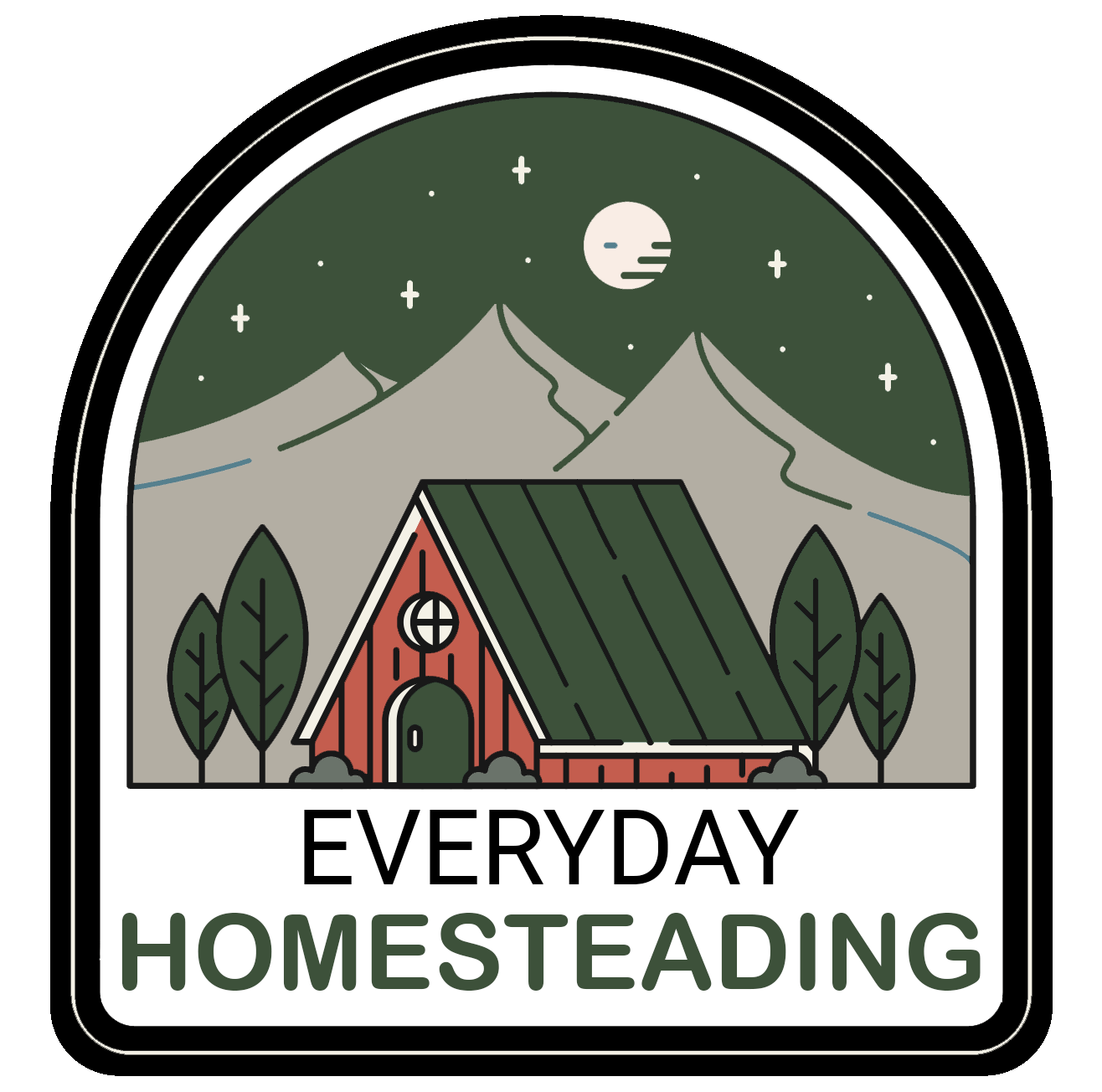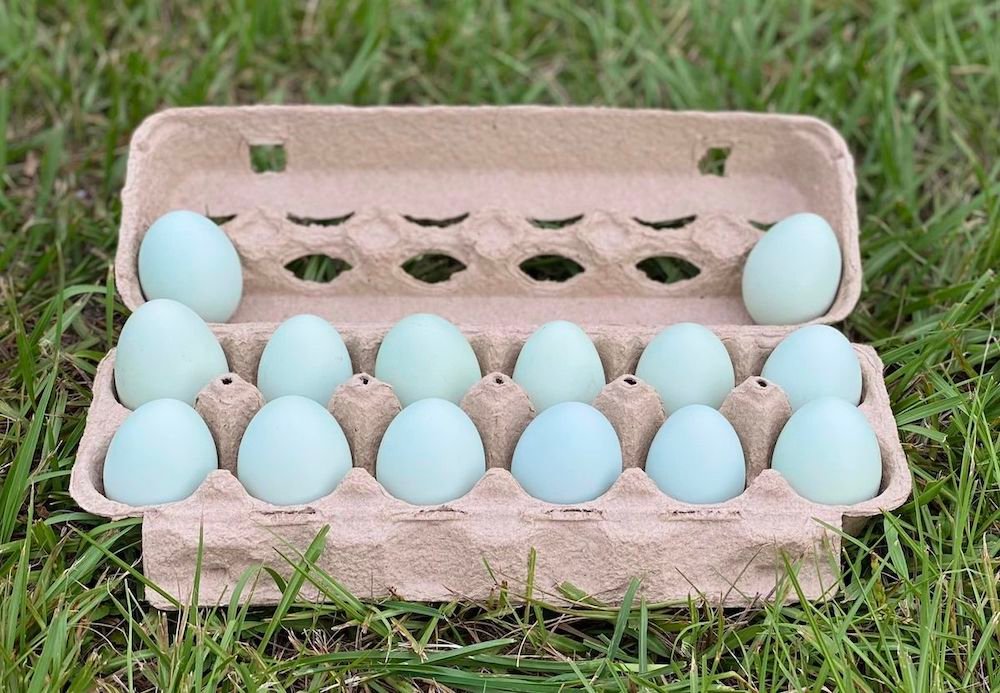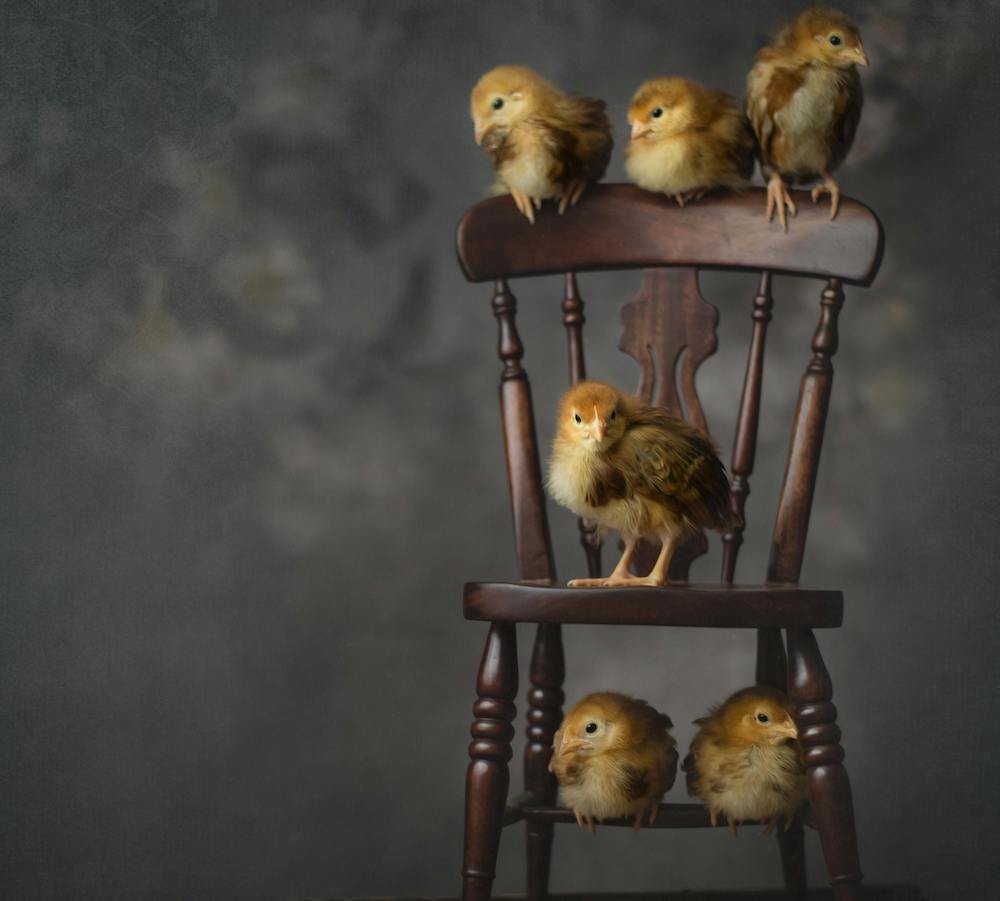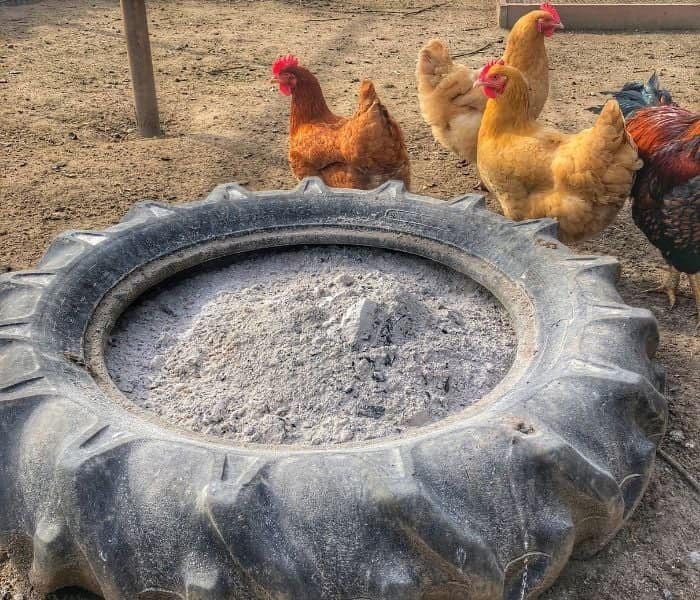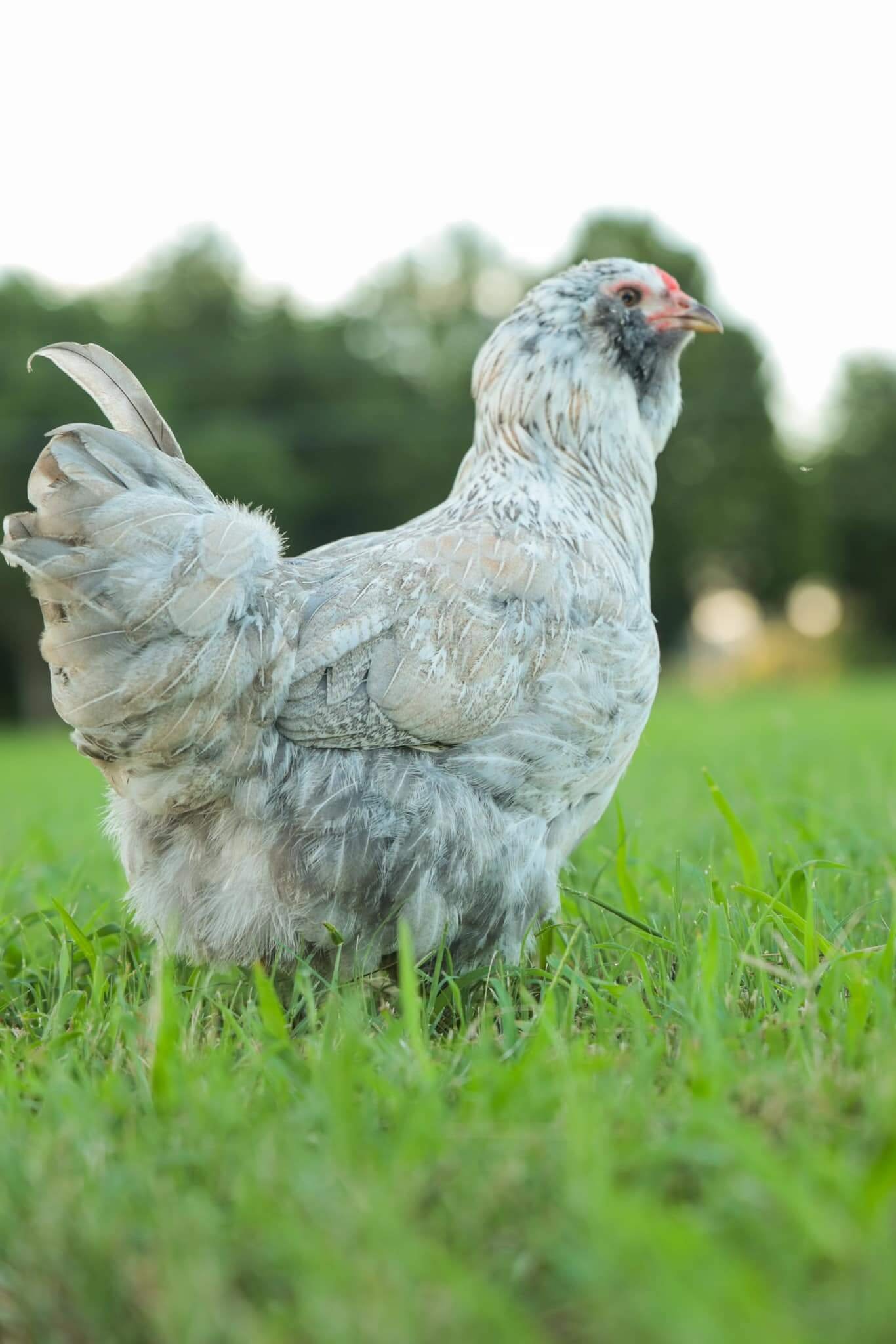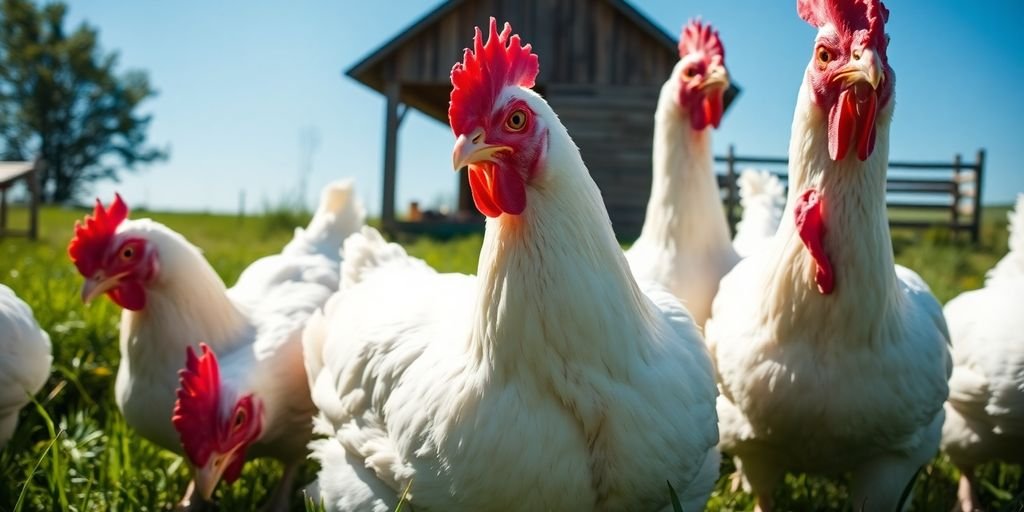Can Chickens Eat Bananas?
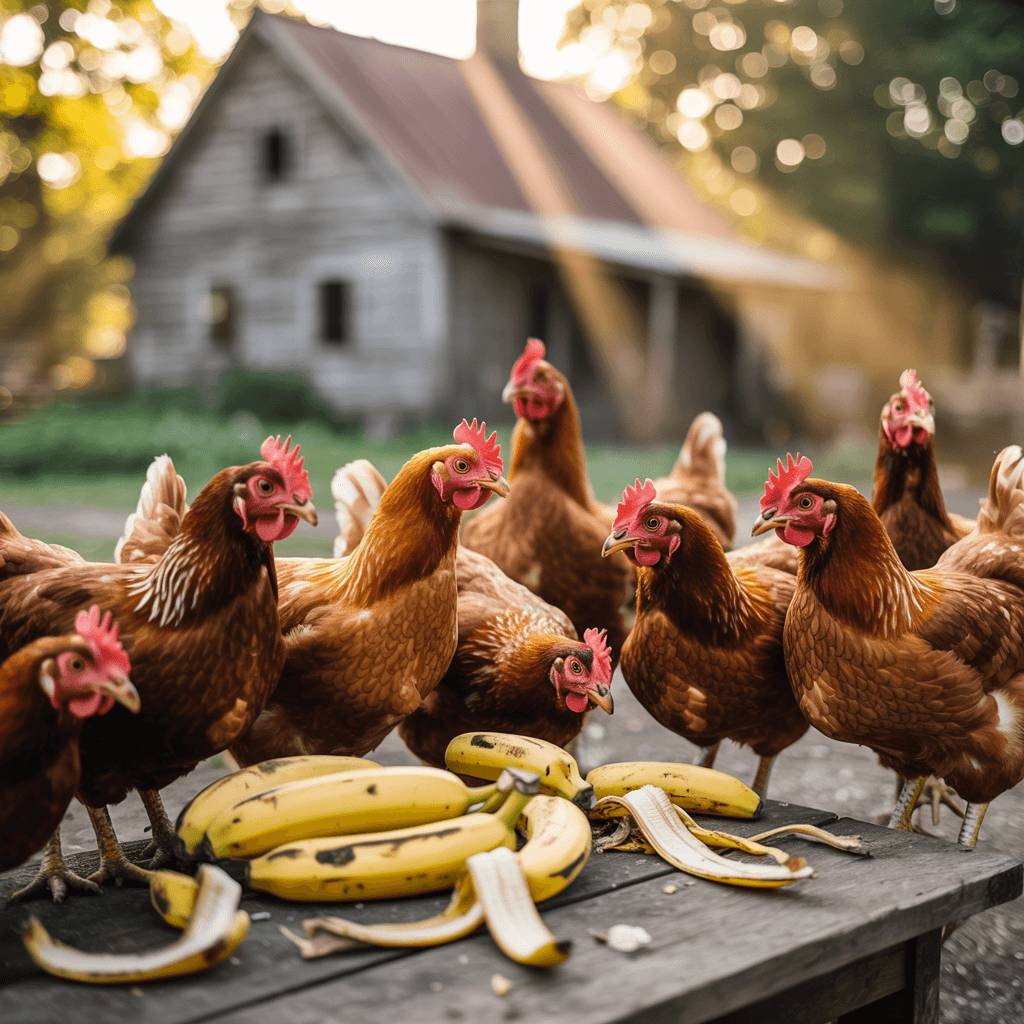
We often get asked, “Can chickens eat bananas?” It’s a good question, and one we’re happy to clear up. As backyard chicken keepers, we’re always looking for ways to give our feathered friends good food. We also want to use up kitchen scraps. So, we put together this guide to help you figure out if bananas are a good fit for your flock and how to feed them safely.
Key Takeaways
- Chickens can eat bananas and banana peels, but in moderation.
- Banana peels give chickens good things like potassium and fiber.
- Chop up banana peels or dry them out to make them easier for chickens to eat.
- Bananas and their peels are treats, not a main food source for chickens.
- Feeding chickens banana peels is a good way to reduce kitchen waste.
Can Chickens Eat Bananas? The Sweet Truth
Yes, Bananas Are a Go!
Guess what? Bananas are totally safe for your chickens to eat! In fact, they can be a pretty awesome treat for your feathered friends. Both the banana itself and the peel are okay, so you don’t have to worry about separating them. It’s a win-win – less waste for you and a tasty snack for your flock. Just think of the joy on their little faces when you toss them a banana!
Nutritional Goodies in Bananas
Bananas aren’t just tasty; they’re packed with nutrients that can benefit your chickens. Here’s a quick rundown:
- Potassium: Important for overall health.
- Vitamins: Bananas contain vitamins like A, C, and B6.
- Fiber: Good for digestion.
Bananas can be a great addition to your chickens’ diet, offering a boost of vitamins and minerals. However, remember that they should be given in moderation as a treat, not as a replacement for their regular feed.
Serving Up Bananas Safely
Okay, so you know bananas are safe, but how should you actually give them to your chickens? Here are a few tips:
- Cut it up: Slice the banana into smaller pieces to make it easier for your chickens to eat. This is especially important for the peel, which can be a bit tough.
- Moderation is key: Don’t overdo it with the bananas. They’re a treat, not a main course. Too much sugar isn’t good for anyone, chickens included.
- Wash the peel: If you’re feeding the peel, make sure to wash it thoroughly to remove any pesticides or dirt. You can even consider buying organic bananas to be extra safe. Remember that poultry feed should be the main source of nutrition.
Peel Power: Can Chickens Eat Banana Peels?
Absolutely, Banana Peels Are Safe!
Good news, fellow chicken keepers! Banana peels are indeed safe for your flock to munch on. As long as they’re free from pesticides and other harmful stuff, you don’t have to worry about them causing any immediate harm. The biggest hurdle is usually their texture. They can be a bit tough for chickens to peck at, especially for smaller breeds or younger birds. So, a little prep work can go a long way in making them more appealing and easier to eat. Think of it as turning a potential waste product into a tasty and nutritious treat for your feathered friends. It’s a win-win!
Making Peels Palatable
Okay, so banana peels are safe, but how do we get our chickens to actually want to eat them? Here are a few tricks we’ve found helpful:
- Chop ’em up: This is the simplest method. Just dice the peels into small, manageable pieces. This makes it easier for the chickens to peck at and swallow.
- Cook ’em: Boiling or baking the peels can soften them up considerably. This is especially useful if you have older chickens or breeds that are a bit more finicky.
- Ferment ’em: Fermenting banana peels not only softens them but also introduces beneficial probiotics, which can be great for your chickens’ gut health. We’ve had success with this method, and the chickens seem to love the slightly tangy flavor.
Peels as a Supplement, Not a Staple
While banana peels offer some nutritional benefits, it’s important to remember that they shouldn’t replace a balanced chicken feed. Think of them as a supplement, a little something extra to add variety and a few extra nutrients to their diet. A good quality feed should always be the foundation of their nutrition. We always make sure our chickens have access to their regular feed before offering any treats, including banana peels. This ensures they’re getting all the essential nutrients they need to stay healthy and lay those delicious eggs. Remember to check out backyard chickens for more information.
Unlocking the Benefits of Banana Peels for Your Flock
Boosting Health with Potassium
We’ve found that banana peels are a surprisingly good source of potassium, which is super important for our chickens. Potassium helps with heart function and muscle development, keeping our flock strong and active. It’s an easy way to give them a little boost without changing their whole diet. Think of it as a natural supplement that comes straight from our kitchen waste. It’s a win-win!
Fiber for Happy Digestion
One thing we’ve noticed since adding banana peels to our chickens’ diet is how much better their digestion seems to be. The fiber in the peels really helps keep things moving smoothly. We all know how important fiber is for us, and it turns out it’s just as important for our feathered friends. It helps prevent digestive issues and keeps them feeling good.
Vitamins for Vibrant Chickens
Beyond potassium and fiber, banana peels also contain a range of vitamins that contribute to the overall health of our chickens. We’re talking about vitamins that can help with everything from their immune system to the quality of their eggs. It’s like a little multivitamin boost in every peel! Remember to boil and chop the peels, as raw peels are too tough.
We’ve learned that incorporating banana peels into our chickens’ diet is more than just a way to reduce waste. It’s a simple way to provide them with extra nutrients that support their health and well-being. It’s all about finding easy, sustainable ways to care for our flock.
DIY Hacks: Preparing Banana Peels for Your Chickens
We’ve found that getting your chickens to actually eat those banana peels sometimes requires a little creativity. They’re not always the most appealing snack straight off the banana! So, let’s explore some easy ways to prep those peels and make them irresistible to your flock.
Chopping for Easy Eating
This is probably the simplest method, and it’s a great starting point. Just chop the banana peels into smaller pieces. Think about the size of treats your chickens usually enjoy. Smaller pieces are easier for them to peck at and digest. We usually aim for pieces about an inch or two in size. This also helps prevent any choking hazards, especially for smaller breeds. You can even mix the chopped peels with their regular feed to encourage them to try them out. It’s a quick way to introduce banana peels into their diet.
Drying and Crushing for Convenience
If you’re looking for a longer-term storage solution, drying and crushing banana peels is the way to go. Here’s how we do it:
- First, thoroughly wash the banana peels to remove any dirt or residue.
- Next, lay the peels out on a baking sheet.
- Then, bake them in the oven at a low temperature (around 150-200°F) for several hours, until they are completely dry and brittle. You can also use a dehydrator if you have one.
- Finally, once the peels are dry, crush them into smaller pieces or grind them into a powder using a food processor or blender. This makes it easy to sprinkle the crushed peels over your chickens’ feed as a supplement.
Creative Ways to Serve Peels
Okay, so you’ve prepped your peels, but how do you get your chickens excited about them? Here are a few ideas we’ve tried:
- Mix with Treats: Combine the chopped or crushed peels with other treats your chickens love, like mealworms or sunflower seeds. This can help mask the taste and texture of the peels.
- Stuff a Suet Feeder: Pack a suet feeder with a mixture of banana peels, seeds, and other goodies. This provides entertainment and encourages them to peck at the peels.
- Make a Peel Garland: String dried banana peel pieces onto a string to create a garland. Hang it in their run for them to peck at. This adds enrichment and encourages natural foraging behavior.
Remember, introducing new foods to your chickens should always be done gradually. Start with small amounts and observe how they react. If they seem uninterested, don’t force it. Just try again later with a different preparation method. We’ve found that persistence pays off!
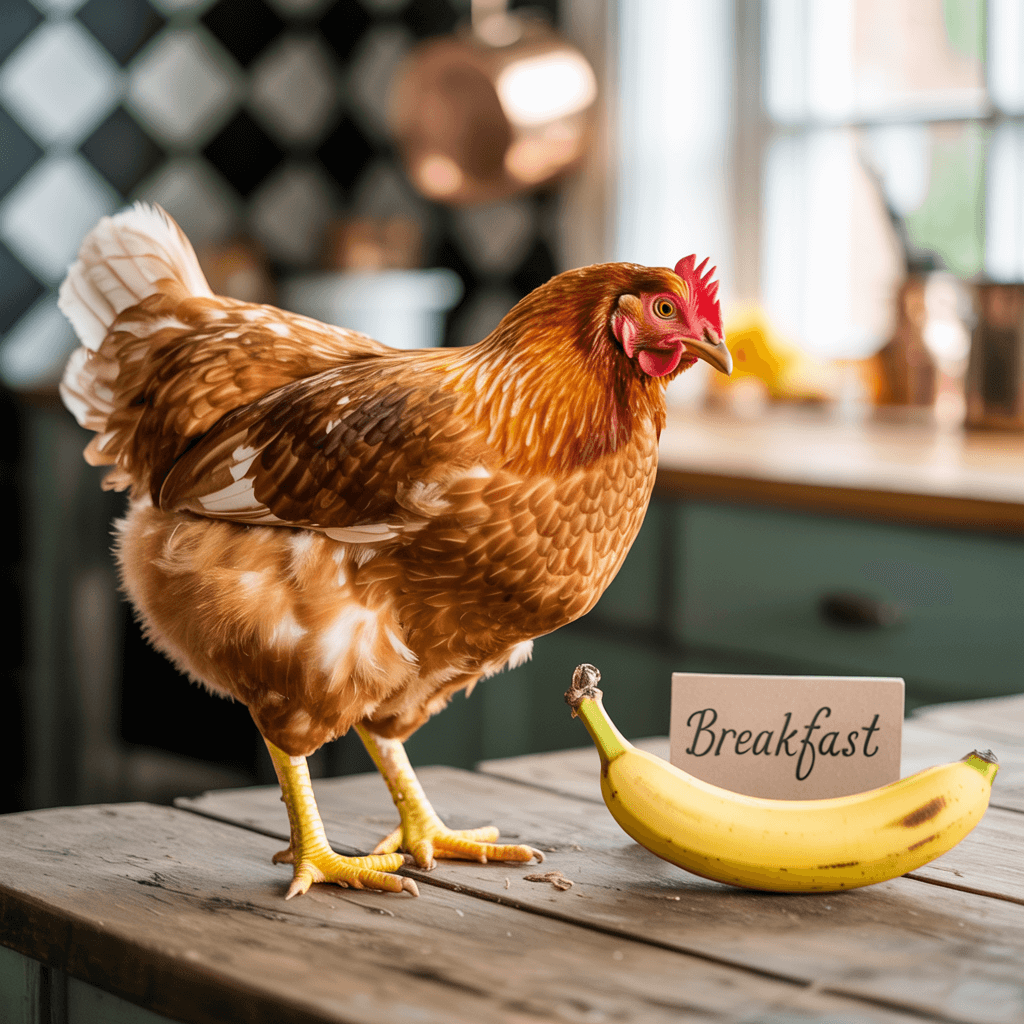
Beyond Bananas: Other Safe Fruits for Your Chickens
We all know chickens love bananas, but what other fruits can they enjoy? It’s great to diversify their diet with some fruity variety. Let’s explore some safe and tasty options for your flock.
Apples and Berries: Fruity Favorites
Apples and berries are generally a big hit with chickens. Apples should be cut up, and it’s important to remove the seeds because they contain small amounts of cyanide. Berries, like blueberries, strawberries, and blackberries, are packed with antioxidants and vitamins. These make excellent treats in moderation.
Melons and Grapes: Hydrating Treats
During the warmer months, melons and grapes can be a fantastic way to keep your chickens hydrated. Watermelon is a particular favorite, thanks to its high water content. Grapes are also hydrating and offer natural sugars, vitamins C and K, and antioxidants. Just remember to cut grapes in half or quarters, especially for younger chickens, to prevent any choking hazards. Cantaloupe and honeydew are also safe, and chickens often enjoy the seeds as well as the flesh. Consider safe foods for chickens to add variety to their diet.
Fruits to Avoid: What’s Not Safe
While many fruits are safe, it’s important to know which ones to avoid. Avocado pits and skins are toxic to chickens due to a substance called persin. It’s best to avoid feeding your chickens any part of an avocado to be on the safe side. Also, be cautious with fruits that have pits, like peaches, plums, and cherries. Always remove the pits before feeding these fruits to your flock, as they can contain compounds that are harmful to chickens.
Remember, moderation is key when feeding your chickens fruit. Fruit should be a treat, not the main part of their diet. A balanced feed should always be their primary source of nutrition.
Sustainable Living: How Bananas Fit into Backyard Chicken Keeping
Reducing Kitchen Waste
Let’s face it, we all generate kitchen waste. Banana peels often end up in the trash, but what if they could be put to better use? By feeding banana peels to your chickens, you’re directly reducing kitchen waste. It’s a simple, effective way to minimize what goes into landfills. Plus, it’s a great feeling knowing you’re turning something that would otherwise be discarded into a nutritious treat for your flock.
A Step Towards Zero Waste Living
Thinking bigger, feeding banana peels to chickens is a small but significant step towards zero waste living. It’s about making conscious choices to reduce our environmental footprint.
Here’s how it works:
- Less waste going to landfills.
- Chickens get a healthy snack.
- We feel good about doing our part.
It’s not just about throwing away less; it’s about rethinking our consumption habits and finding creative ways to reuse and repurpose what we have.
The Eco-Friendly Chicken Keeper
Being an eco-friendly chicken keeper is about more than just feeding your chickens scraps. It’s about creating a sustainable system where everything has a purpose. Consider these points:
- Composting chicken manure to enrich your garden soil.
- Using recycled materials for your coop.
- Sourcing feed locally to reduce transportation emissions.
By incorporating these practices, we can create a truly eco-friendly chicken keeping setup that benefits both our chickens and the environment. It’s a win-win situation!
Balancing the Diet: Bananas and Overall Chicken Nutrition
Bananas as a Healthy Treat
We all love giving our chickens treats, and bananas can be a great option! They’re sweet and chickens usually enjoy them. However, it’s important to remember that bananas, like any treat, should only make up a small portion of their overall diet. Think of them as a dessert, not the main course. Too many bananas can lead to an imbalance in their nutritional intake, potentially causing health problems down the road.
The Importance of a Balanced Feed
A high-quality, balanced chicken feed should always be the foundation of your flock’s diet. This feed is specifically formulated to provide all the essential nutrients they need, including protein, carbohydrates, fats, vitamins, and minerals. Bananas, while nutritious, don’t offer everything a chicken needs to thrive. Think of it this way:
- Balanced Feed: Provides the complete nutritional foundation. It’s their main source of sustenance.
- Bananas (and other treats): Offer supplemental nutrients and variety, but shouldn’t replace the core diet.
- Grit: Essential for digestion, especially when chickens are eating treats like bananas.
A balanced diet is key to healthy chickens. Treats like bananas should be given in moderation and should never replace their regular feed. Overfeeding treats can lead to obesity and other health issues.
Monitoring Your Flock’s Health
Keeping a close eye on your chickens is crucial. Watch for any signs of dietary imbalances, such as changes in egg production, feather quality, or overall behavior. If you notice anything unusual, it’s always best to consult with a veterinarian or poultry expert. Remember, every flock is different, and what works for one might not work for another. We need to adjust their diet as needed, and ensure they have access to fresh water at all times. If you are concerned about chicken health, consult a professional.
Wrapping Things Up: Happy Chickens, Happy Life
So, there you have it! We’ve gone through a lot about feeding bananas to your chickens. It’s pretty clear that bananas, and even their peels, can be a nice little extra for your flock. Just remember, it’s all about balance. Think of bananas as a fun snack, not their main meal. Their regular chicken feed is still super important for keeping them healthy and laying those yummy eggs. If we give them a mix of good stuff and keep an eye on how they’re doing, we’ll have happy, healthy chickens. And honestly, that’s what we all want, right?
Frequently Asked Questions
Can our chickens eat bananas?
Yes, chickens can eat bananas! They love the sweet fruit. Just make sure to give it to them in small pieces so they don’t choke. Bananas are a good treat because they have vitamins and minerals that are good for your flock.
Are banana peels safe for our chickens?
Absolutely! Banana peels are safe for chickens to eat. They’re actually full of good stuff like fiber and potassium. It’s best to chop them up into smaller bits or even dry and crush them. This makes them easier for your chickens to peck at and digest.
What are the benefits of banana peels for our chickens?
Banana peels offer some great health benefits for your chickens. They have potassium, which helps with their heart and muscles. The fiber in the peels is good for their digestion, and they also contain different vitamins that help keep your chickens healthy and strong.
How should we prepare banana peels for our chickens?
To make banana peels easier for your chickens to eat, we suggest chopping them into small pieces. You can also dry them out and then crush them into flakes or powder. Some people even mix them into their chickens’ regular feed.
Can bananas replace our chickens’ regular food?
While bananas and their peels are good treats, they shouldn’t be the main part of your chickens’ diet. Think of them as a healthy snack. Your chickens still need their regular chicken feed to get all the important nutrients for their overall health and to lay good eggs.
What other fruits can our chickens eat safely?
Yes, many other fruits are safe for chickens! Apples (without the seeds), berries, melons, and grapes are all good choices. Just remember to always remove any seeds or pits from fruits like apples, peaches, or cherries, as these can be harmful. And always give treats in moderation!



